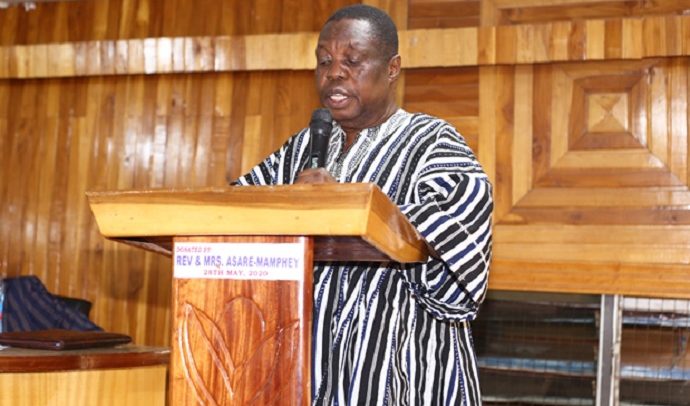Kwasi Adu Gyan addressing stakeholders on e-mobility policy implementation in Techiman
Regional Minister for the Bono East Region, KwasiAduGyan, has urged the Ministry of Transport to encourage car owners to convert their vehicles from petrol and diesel engines to electrically charged engines.
According to him, this would assist the country accelerate the implementation of the national Electricity Vehicle Policy in order to satisfy the Paris Climate Change Agreement.
Mr. Gyan made the suggestion while speaking at a consultative forum in Techiman, the Bono East capital, to solicit feedback from stakeholders on the implementation of the e-mobility programme.
The forum was organised by the Ministry of Transport in partnership with the Ministries of Energy and Finance, and it was made possible by the Climate Change Technology Centre Network and the United Nations Environment Programme Copenhagen Centre on Climate Change.
Mr. Gyan, who addressed participants including members of the Ghana Police Service, the Ghana Fire Service, the National Ambulance Service, District and Municipal Chief Executives, and heads of departments from the region, emphasised the importance of accelerating the transition from petrol and diesel engines to electric engines in order to catch up with the rest of the world.
He claimed that the reform would protect the environment and minimize ailments caused by carbon dioxide and nitrogen dioxide emissions from gasoline and diesel automobiles.
“The Paris Agreement is an internationally binding climate change policy. The objective is to hold the global average temperature to below two degrees Celsius above pre- industrial levels.
“As such and to begin, we must retrofit 2 and 3 wheeler vehicles to switch from fossil to electric engine as is being done in India and China. The practice can be scaled up and replicated throughout the country to achieve the desired impact. There is the need to decarbonize the transporter sector quickly,” he noted.
Speaking on behalf of his boss, KwakuOforiAsiamah, the deputy transport minister, Hassan Tampuli, stated that Ghana’s transportation industry has become a major source of greenhouse gas emissions, highlighting the need to decarbonize it in accordance with the climate change agreement to which Ghana is a signatory.
“Statistics from the DVLA indicate there are currently 3.2m registered vehicles in the country of which 72% are petrol powered, 27 percent diesel powered and less than one percent LPG powered,” he stated.
He stated that the UN has warned that allowing global temperatures to rise above 1.5 degrees Celsius will be devastating for the planet, therefore the necessity to design an E-mobility policy and oversee its implementation in order to decarbonize the atmosphere.
He explained that countries are fast implementing zero emission policies such as Norway, and China.
“With this, car manufacturers have served notice they will soon stop manufacturing fossil fuel vehicles and we don’t want Ghana to become a dumping ground for these vehicles.
“So we are holding stakeholders’ engagement in all regional capitals to collect views on the implementation of the e-mobility policy.
“This is factored into the National Energy Transition Plan 2022 to implement a more efficient, eco-friendly and sustainable transport system in the country,” he said.
Dr. Mensah Bonsu of the Ministry of Transport stated that private sector investors have already begun importing e-vehicles into the nation, claiming that some assembly locations for retrofitting already exist.
He stated that the types of available e-automobiles that the government is looking at include Hybrid-Electric automobiles, Hybrid Plug in Vehicles, and Fuel Cell Vehicles, and he encouraged people to consider them when purchasing vehicles, despite the fact that they are highly expensive.
FROM Daniel Y Dayee, Techiman


